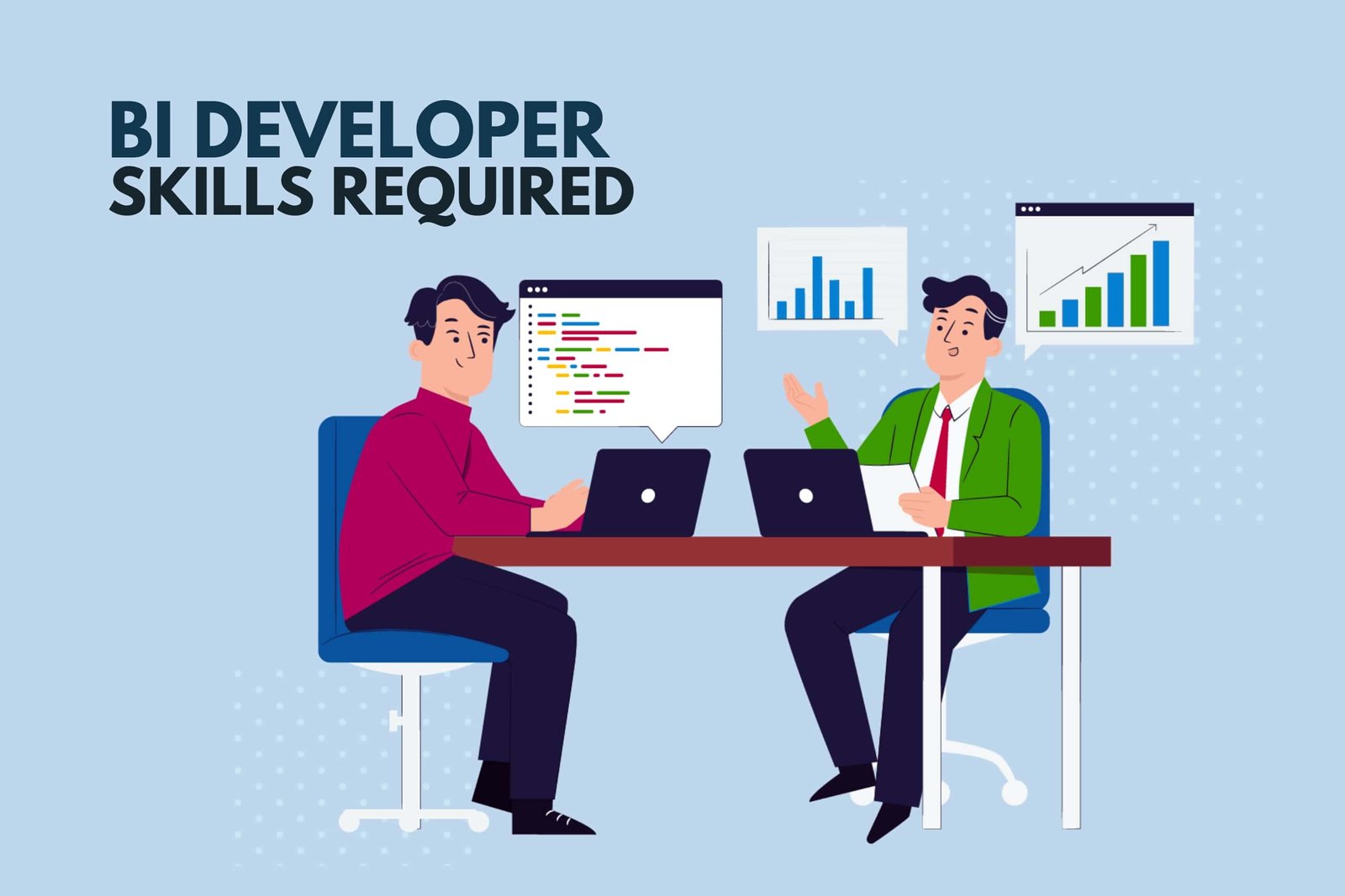What is Business Intelligence?
Business Intelligence (BI) refers to the technology, techniques, and practises that are used to gather, evaluate, and present information about an organisation in order to assist decision-making and generate effective administrative action. It is the process of converting raw data into relevant and practical knowledge to help evaluate the performance of businesses, discover trends, and make well-informed choices.
Data gathering, Data Integration, Data Modelling, analysis of information, and data visualization are all part of intelligence for businesses. It frequently requires the use of specialised software and tools to aid in the gathering and analysis of data from many different places such as spreadsheets, tables of information, and enterprise systems.
Based on the report of Zion Research, the global market of Business Intelligence rose from $16.33 billion in 2015 and reached around $26.50 billion in 2021.
What Does a BI Developer Do?
A BI Developer is responsible for developing, deploying and maintaining BI tools and interfaces and simplifying the technical language into easily understandable format. BI Developers are responsible for helping organisations in making important decisions by providing quantifiable solutions to complex problems. Hence, BI developers require to work with all kinds of data including data stored in warehouses and new data collected from multiple sources.
How to become a BI Developer?
Becoming a Business Intelligence (BI) Developer requires a combination of technical skills, knowledge of BI concepts, and experience working with data. Here are steps you can follow to pursue a career as a BI Developer:
- Acquire a solid foundation in data and analytics: Start by building a strong understanding of data concepts, relational databases, SQL (Structured Query Language), and data modeling. Familiarize yourself with data analysis techniques and tools.
- Learn BI technologies: Gain proficiency in popular BI tools and technologies such as Microsoft Power BI, Tableau, QlikView, or MicroStrategy. Explore their features, functionalities, and best practices for creating reports, dashboards, and visualizations.
- Develop programming skills: Enhance your programming skills, particularly in languages commonly used in BI development such as SQL, Python, or R. This will enable you to manipulate and transform data, perform complex calculations, and create custom scripts for data processing and analysis.
- Gain hands-on experience with data integration: Learn about data integration techniques to combine data from various sources, such as databases, spreadsheets, and APIs. Practice working with Extract, Transform, Load (ETL) tools like Microsoft SQL Server Integration Services (SSIS) or Talend.
- Build data modeling expertise: Understand the principles of data modeling and design dimensional data models for efficient reporting and analysis. Familiarize yourself with concepts like star schemas, snowflake schemas, and slowly changing dimensions.
- Develop data visualization skills: Learn how to create visually appealing and informative dashboards, reports, and visualizations using BI tools. Gain knowledge of data visualization best practices and techniques to effectively communicate insights.
- Gain industry-specific knowledge: Familiarize yourself with the specific industry or business domain you are interested in working with. Understand the key metrics, KPIs, and reporting requirements relevant to that industry to design meaningful BI solutions.
- Stay updated on industry trends: BI technologies and practices evolve rapidly. Stay informed about the latest trends, advancements, and emerging technologies in the field of business intelligence. Participate in webinars, attend conferences, and join relevant professional communities.
- Build a portfolio: Develop a portfolio of BI projects that showcase your skills and demonstrate your ability to deliver actionable insights through effective data visualization and reporting. Include examples of reports, dashboards, and data models you have created.
- Gain practical experience: Seek opportunities to apply your skills in real-world scenarios. Look for internships, freelance projects, or volunteer work where you can work with data and gain hands-on experience in BI development.
- Continuous learning: BI technologies and practices continue to evolve. Stay curious and committed to continuous learning. Explore advanced topics like data analytics, machine learning, and cloud-based BI solutions to expand your skill set.
By following these steps, continuously refining your skills, and gaining practical experience, you can establish yourself as a competent BI Developer and pursue a successful career in the field of business intelligence.
Read Blog: How Business Intelligence helps in Decision Making
Roles and Responsibilities of BI Developer:
The primary focus for a BI developer is to solve problems and continuously plan and research all the possible solutions for any problem that exist including the potential future problems. Additionally, they are also responsible for building Online Analytical Processes (OLAP) with the help of relational and multidimensional databases.
Some of the common duties of a BI Developer are as follows:
- Providing BI reports and tools
- Performing SQL Queries including design, code, test and aggregate the results in creating useful information.
- Writing technical documents on database content
- Mapping the various databases used in an organisation
- Developing, designing and analysing data architecture and data warehouses.
BI Developer Skills Required:
To excel in this role, BI Developers need to possess a range of technical and soft skills. Here are some key skills that are essential for BI Developers:
- Data Analysis and SQL: Strong data analysis skills are fundamental for BI Developers. They should have a solid understanding of SQL (Structured Query Language) to extract, manipulate, and analyse data from databases. Proficiency in writing complex queries, aggregating data, and applying analytical functions is vital.
- Business Intelligence Tools: BI Developers should be proficient in working with popular BI tools such as Microsoft Power BI, Tableau, QlikView, or MicroStrategy. They should have hands-on experience in creating interactive dashboards, reports, and visualizations to effectively communicate insights to stakeholders.
- Data Modelling and ETL: Data modelling skills are crucial for designing efficient and scalable data structures. BI Developers should be familiar with dimensional modelling techniques, including star schemas, snowflake schemas, and slowly changing dimensions. Knowledge of Extract, Transform, Load (ETL) processes and tools like Microsoft SQL Server Integration Services (SSIS) or Talend is essential for data integration and transformation.
- Programming Languages: Proficiency in programming languages like Python or R is advantageous for performing advanced data analytics, implementing statistical models, and building Data Pipelines. These languages enable BI Developers to automate repetitive tasks, perform data transformations, and leverage machine learning algorithms for predictive analytics.
- Data Visualization: BI Developers should have a strong grasp of data visualization principles and best practices. They should be skilled in selecting appropriate chart types, creating intuitive dashboards, and presenting data in a visually compelling manner. Knowledge of tools like D3.js or Plotly can further enhance their data visualization capabilities.
- Database Management: Understanding database concepts and having experience with database management systems (DBMS) is vital. BI Developers should be familiar with relational databases, data warehousing, data governance, and performance optimization techniques. Proficiency in SQL Server, Oracle, or MySQL is often required.
- Problem-solving and Analytical Thinking: BI Developers must possess strong problem-solving skills and the ability to think analytically. They should be able to understand complex business requirements, identify data patterns, and apply analytical techniques to solve business problems effectively.
- Communication and Collaboration: Effective communication skills are essential for BI Developers to understand business requirements, collaborate with stakeholders, and present insights in a clear and concise manner. They should be able to translate technical concepts into non-technical language and work collaboratively with cross-functional teams.
- Attention to Detail: BI Developers should be meticulous and have a keen eye for detail. They should ensure data accuracy, validate results, and perform quality assurance to deliver reliable and trustworthy insights.
- Continuous Learning: BI is a rapidly evolving field with new technologies and techniques emerging regularly. BI Developers should have a thirst for continuous learning and stay updated with the latest industry trends, tools, and methodologies. They should actively engage in professional development activities, attend conferences, and participate in online communities.
In addition to these technical skills, BI Developers should also possess strong analytical thinking, problem-solving abilities, and a keen business acumen. They should be able to understand the context behind the data and provide actionable insights that drive informed decision-making.
While technical skills are essential, it’s worth noting that soft skills like effective communication, collaboration, and the ability to translate technical concepts into business terms are equally important for BI Developers. A well-rounded combination of technical and soft skills enables BI Developers to excel in their roles and deliver valuable insights to organizations.
BI Developer Salary:
The average salary for a BI Developer in India ranges between Rs 3.4 Lakhs to 11.4 Lakhs annually. Accordingly, the average annual salary stands at Rs 6 Lakh per annum.
Choosing the Right Course for BI Developer:
For embarking on the BI Developer career path, you need to ensure that you opt for the right courses which will allow you to become proficient in the field. Accordingly, BI Developer Certification Course available in the market will help you expand your skills and knowledge. By Pursuing the Data Mindset Course by Pickl.AI, which will help you learn about Business Intelligence and enhance your capabilities to become an expert.
Conclusion
From the above blog, you have come to know about who is a BI developer and learnt about the roles and responsibilities of the professional. You need to ensure that while you pursue BI developer as your career choice, you have the right skills and conceptual knowledge. Moreover, having practical experience in utilising BI tools and providing intelligent solutions will help you rise high in the market.
FAQs
Is business intelligence a tech role?
The process of Business Intelligence is tech-driven and a BI Developer needs to have technical knowledge or experience in the similar field.
What is high salary in business intelligence?
A business Intelligence professional with 4-9 years of experience may earn Rs 8.9 lakhs a year while the one with more than 10 years of experience may earn annually Rs 20 Lakhs.
Which degree is best for business intelligence?
A Bachelor Degree in Business Intelligence can be a promising career choice for the aspirants, but if you’re a student, graduate or working professional willing to develop your skills as a BI Developer, you can opt for Data Analytics course from Pick.AI.
Is business intelligence part of AI?
BI is not a part of AI but they are complementary. The intelligence in AI refers to that of computer intelligence while BI refers to intelligence in business decision-making.
Is BI developer same as data analyst?
The focus of a Business developer is mainly across the wider spectrum of business by viewing it holistically while on Data Analysts focus on answering questions based on the data collected and automating the reports.











